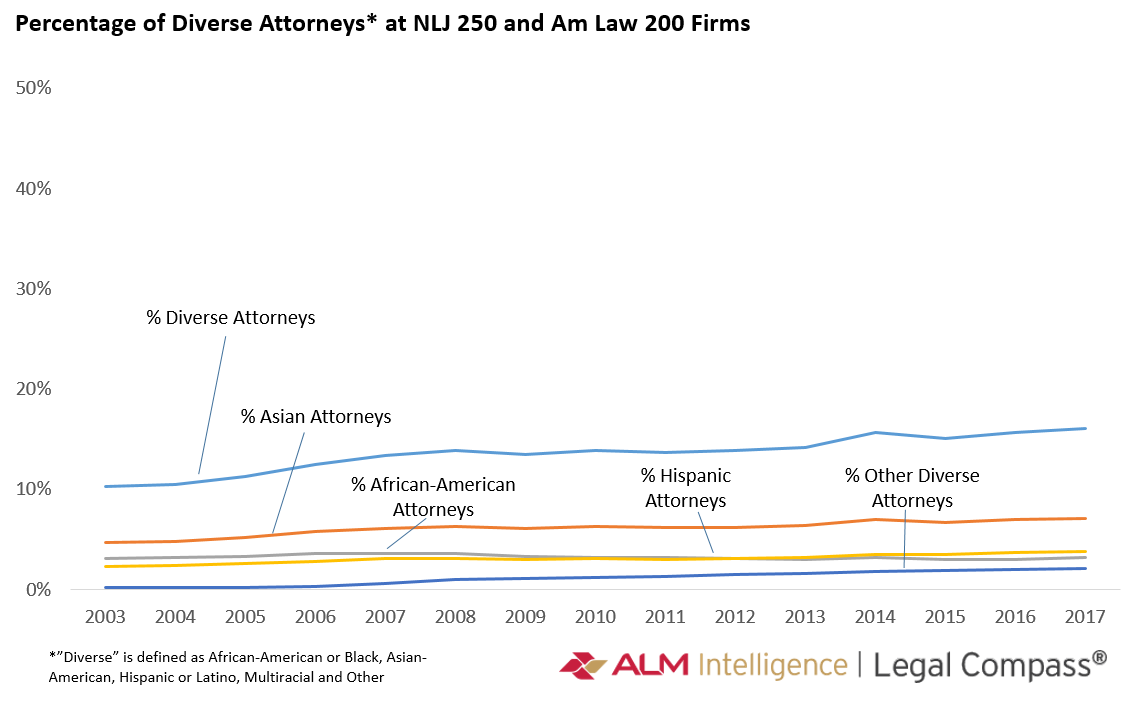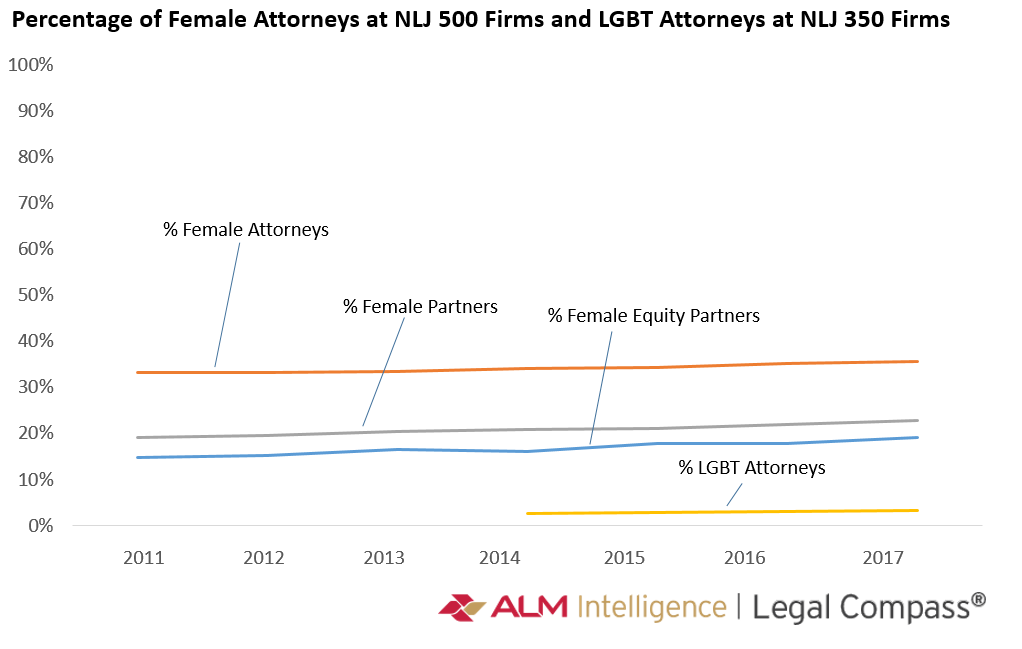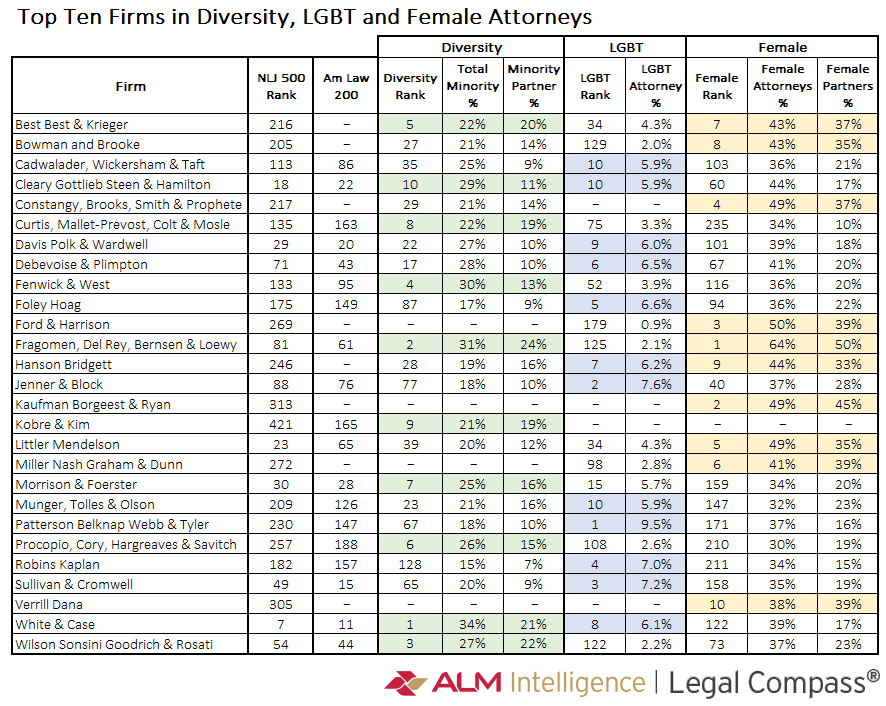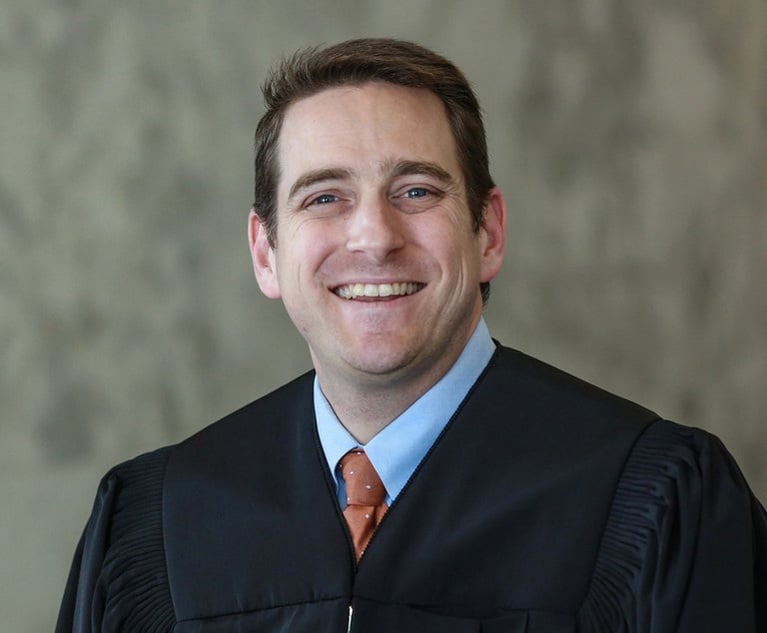There's A Diversity Problem At Law Firms - What Can Be Done?
Law firm diversity is a long-standing challenge. Here are some ideas and resources to help move the needle.
March 07, 2019 at 08:44 AM
9 minute read
Where We Are
Recently 170 GCs pledged a call to action in an open letter to law firms: “Improve Diversity or Lose Our Business”. This message and ultimatum are much needed in an industry with 19% women equity partners, 16.1% diverse attorneys and 3.2% LGBT attorneys. This, however, is not the first time we've seen this approach. In 2004 there was the “A Call to Action: Diversity in the Legal Profession”, which was written by Sara Lee's General Counsel Roderick Palmore. Soon after, 60 GCs had signed on in support. In 2016, the ABA issued their own “call to action”. In July of that same year, the ABA's House of Delegates passed Resolution 113, which called on clients to direct a greater percentage of the legal services they purchase to diverse attorneys. There are many more examples beyond these three. This begs the question, how effective are these public calls for change?
Looking at the data in Legal Compass on diverse attorneys at NLJ 250 and Am Law 200 firms, we clearly see two things:
- The diversity problem in the legal industry has existed for a long time
- Not much has changed
A deeper dive into the data helps reveal the extent of the diversity problem in the legal industry. The data in the graph above, which comes from ALM's Diversity Scorecard and is self-reported by law firms, shows an upward trend in diverse attorneys since 2003. Here's the problem: the speed of change has been slow and uneven. Over the past decade and a half, the share of diverse attorneys has increased from 10.3% to 16.1%. Over the same period, the share of African-American attorneys has not changed at all. The percentage of Asian and Hispanic attorneys has ticked up slightly but still remains in the single digits, at 7.1% and 3.8% respectively. This trend of slight upward movement encompasses all diversity categories, including female attorneys and LGBT attorneys (see our scorecards here and here). If you look closely at the graph below of law firm self-reported data, you can see that indeed the lines are moving up. Ever so slightly. Is this the kind of “action” clients were hoping for from law firms? I suspect not.
Where Does The Legal Profession Go From Here?
Where do we go from here? This question has been on repeat. Nevertheless, it remains relevant and needed. Where do we go? What is next? What is the answer to solving the diversity issue at law firms? The answer is that there is no single answer. Change will happen when the issue is pushed from both the law firm and the client, and everywhere in-between.
The truth is that there is a lot that law firms can and should be doing to make any noticeable change on the diversity front. ALM Intelligence put together a Gender Diversity Best Practices Checklist to help guide law firms, which can easily be adapted to include other diversity categories (for the checklist, refer to the Appendix in this free report). The checklist can be used as a guide to help law firms improve gender diversity and inclusion, and covers topics across hiring, training, firm practice, family matters and metrics. A few ideas from the Checklist include ensuring that the allocation of origination credit is neutral by instituting a gender-diverse committee and third-party oversight, and ensuring the firm's succession plan is gender neutral. Despite data largely indicating the issues lie inside the law firm, there is a strong argument to be made that GCs are in a better position to initiate change. As James Beckett, CEO of Qualmet succinctly puts it, “GCs and the in-house teams have the collective buying power. This can be used to make a change.” So, how?
The topics covered in the Gender Diversity Best Practices Checklist can also largely be applied to the legal department for their own internal use, as well as brought up with current law firm partners and potential partners. Does your firm have a gender-blind diversity review process? Does your firm have gender diversity targets for partner classes? Does your firm monitor diversity of client teams and ensure diversity across client relationships? These are a few questions from the Checklist and can be explicitly asked about – or even better, required – from the client side.
There are other resources, too, that help GCs take matters into their own hands. Resources that make it much easier to find and choose a law firm or gain a true glimpse of the diversity make-up of a law firm currently engaged with. A fantastic one is Diversity Lab's Mansfield Rule. Diversity Lab, as Founder and CEO Caren Ulrich Stacy puts it, “experiments with innovative solutions that leverage data, behavioral science, design thinking and technology” to help close the gender gap and increase diversity and inclusion in the legal industry. The Mansfield Rule is a certification process led by Diversity Lab that is not only an outstanding initiative but a great tool and reference. The Mansfield Rule's inaugural one-year pilot resulted in 41 law firms achieving Mansfield Certification. This means that these firms considered at least 30% women and attorneys of color for law firm leadership and governance roles, equity partner promotions and senior lateral positions. This program establishes a baseline, and then tracks, documents, measures progress and identifies areas for improvement. The Mansfield Rule 2.0, which is currently underway, was broadened to include consideration of LGBTQ+ attorneys in addition to female and attorneys of color. Mansfield Rule 2.0 also adds measuring consideration for participation in client pitches and requests that the participating law firms make their processes for appointment and election transparent to all their lawyers. There are 65 firms participating, with the certification process ending July 2019.
ALM's Legal Compass has the data to benchmark firms against each other and against the high performers in diversity. The table below lists out the top ten firms in ALM Legal Intelligence's Diversity, LGBT and Female law firm data. Keep in mind this table only includes Am Law 200 and NLJ 500 law firms. Nevertheless, this data gives GCs something tangible and measurable to use toward their call to action movement.
Of course, just as it's not singularly on law firms to correct the situation, there are other parties in addition to GCs that can have a big impact on diversity in the legal industry. Legal procurement has a unique role, as Silvia Hodges Silverstein, CEO of Buying Legal Council, explains:
“Procurement can and should take the lead when it comes to supplier diversity. Rather than a “tick the box” exercise in RFPs, procurement has the opportunity to move the needle on the issue, such as educating firms and other legal suppliers about the importance of supplier diversity for the company; working with business units to set supplier diversity goals; and sharing the results with the executive team on quarterly basis for (re)aligning non-diverse spend to diverse spend. Some firms may soon miss out on bids because they can't meet the demands on diversity and inclusion. I recommend firms to be proactive now and embrace diversity and inclusion.”
With such a broad-reaching role in the legal industry, there are many distinct actions legal procurement can take. Adrienne Fox, a legal procurement industry professional who also happens to be passionate about diversity, breaks this down into clear-cut actions:
“The buy-side can take action to ensure that during requests for proposals and engagements of law firms and legal services providers, diversity is at the top of mind and openly discussed. Specifically:
- Formal requests should include questions such as:
- What is your firm/company philosophy on diversity? Why is it important?
- How does your firm or company manage diversity within staffing and hiring practices?
- How do you plan to bring diversity into the team assigned to work for us/the client?
- Where possible and when qualified, diverse firms and providers should be included in the bidding. In some larger companies, including a diverse candidate company on bids is required.
- Outside of bidding, buyers of legal services can start thinking about where there are possibilities to use diverse firms or providers that are within their line of business.
- Collaborate more with in-house legal staff and put the topic of diversity on the agenda to discuss. Identify if there is a particular niche of work that a diverse firm or service provider can fill and discuss how they can collaborate more on making diversity part of the mission for how the collective team operates and engages firms and providers.”
For those in the legal procurement field unsure of how to gain this expertise, Buying Legal Council is a valuable resource. Its mission is to improve the legal procurement field, and the value these groups bring. Buying Legal Council is also a forum for sharing intelligence on legal sourcing and on best practices in the field. Among many topics, diversity and inclusion is a prominent topic covered and discussed.
Bringing the diversity issue in the legal industry to light also provides the opportunity for diverse law firms to start pushing forward in the market. Clients are more, now than ever, actively trying to make an impact on diversity in the legal industry. If they are approached by a firm or made aware of firms with verifiable diversity, the client is more likely to switch or take on a new law firm, than if it's left to the legal department to seek out.
Diversity in law firms and the legal industry as a whole is a daunting challenge at best. Once all members of the legal industry, no matter how large or small, start to do their part, then we will see some positive movement at a faster pace. Shared in this article are some ideas on how to make some progress – what else can we do?
This content has been archived. It is available through our partners, LexisNexis® and Bloomberg Law.
To view this content, please continue to their sites.
Not a Lexis Subscriber?
Subscribe Now
Not a Bloomberg Law Subscriber?
Subscribe Now
NOT FOR REPRINT
© 2025 ALM Global, LLC, All Rights Reserved. Request academic re-use from www.copyright.com. All other uses, submit a request to [email protected]. For more information visit Asset & Logo Licensing.
You Might Like
View All
Retention, Development and 'Empowering Teams': This Am Law 200 Firm's Newest Practice Leader Says Objectives Haven't Changed
6 minute read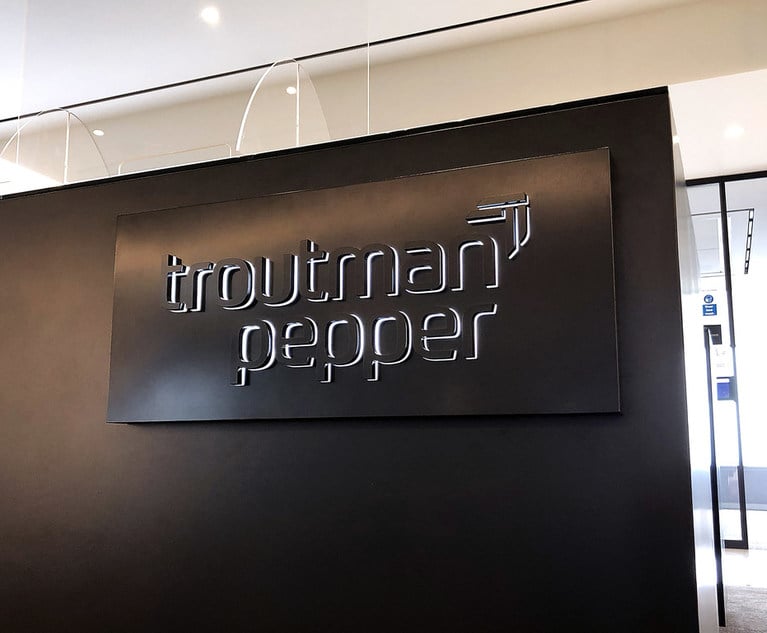
Troutman Pepper Says Ex-Associate Who Alleged Racial Discrimination Lost Job Because of Failure to Improve
6 minute read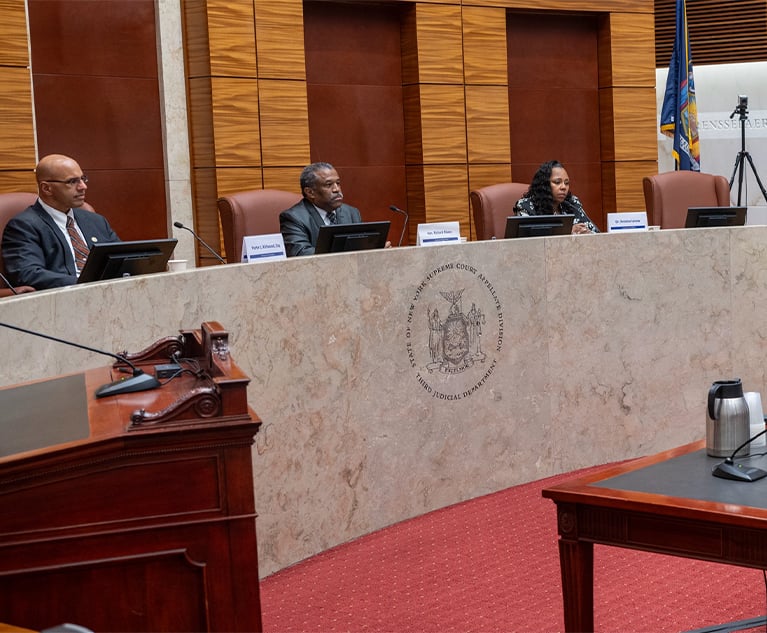
'Reluctant to Trust'?: NY Courts Continue to Grapple With Complexities of Jury Diversity
Trending Stories
- 1CFPB Labor Union Files Twin Lawsuits Seeking to Prevent Agency's Closure
- 2Crypto Crime Down, Hacks Up: Lawyers Warned of 2025 Security Shake-Up
- 3Atlanta Calling: National Law Firms Flock to a ‘Hotbed for Talented Lawyers’
- 4Privacy Suit Targets Education Department Over Disclosure of Student Financial Data to DOGE
- 5Colwell Law Group Founder Has Died in Skiing Accident
Who Got The Work
J. Brugh Lower of Gibbons has entered an appearance for industrial equipment supplier Devco Corporation in a pending trademark infringement lawsuit. The suit, accusing the defendant of selling knock-off Graco products, was filed Dec. 18 in New Jersey District Court by Rivkin Radler on behalf of Graco Inc. and Graco Minnesota. The case, assigned to U.S. District Judge Zahid N. Quraishi, is 3:24-cv-11294, Graco Inc. et al v. Devco Corporation.
Who Got The Work
Rebecca Maller-Stein and Kent A. Yalowitz of Arnold & Porter Kaye Scholer have entered their appearances for Hanaco Venture Capital and its executives, Lior Prosor and David Frankel, in a pending securities lawsuit. The action, filed on Dec. 24 in New York Southern District Court by Zell, Aron & Co. on behalf of Goldeneye Advisors, accuses the defendants of negligently and fraudulently managing the plaintiff's $1 million investment. The case, assigned to U.S. District Judge Vernon S. Broderick, is 1:24-cv-09918, Goldeneye Advisors, LLC v. Hanaco Venture Capital, Ltd. et al.
Who Got The Work
Attorneys from A&O Shearman has stepped in as defense counsel for Toronto-Dominion Bank and other defendants in a pending securities class action. The suit, filed Dec. 11 in New York Southern District Court by Bleichmar Fonti & Auld, accuses the defendants of concealing the bank's 'pervasive' deficiencies in regards to its compliance with the Bank Secrecy Act and the quality of its anti-money laundering controls. The case, assigned to U.S. District Judge Arun Subramanian, is 1:24-cv-09445, Gonzalez v. The Toronto-Dominion Bank et al.
Who Got The Work
Crown Castle International, a Pennsylvania company providing shared communications infrastructure, has turned to Luke D. Wolf of Gordon Rees Scully Mansukhani to fend off a pending breach-of-contract lawsuit. The court action, filed Nov. 25 in Michigan Eastern District Court by Hooper Hathaway PC on behalf of The Town Residences LLC, accuses Crown Castle of failing to transfer approximately $30,000 in utility payments from T-Mobile in breach of a roof-top lease and assignment agreement. The case, assigned to U.S. District Judge Susan K. Declercq, is 2:24-cv-13131, The Town Residences LLC v. T-Mobile US, Inc. et al.
Who Got The Work
Wilfred P. Coronato and Daniel M. Schwartz of McCarter & English have stepped in as defense counsel to Electrolux Home Products Inc. in a pending product liability lawsuit. The court action, filed Nov. 26 in New York Eastern District Court by Poulos Lopiccolo PC and Nagel Rice LLP on behalf of David Stern, alleges that the defendant's refrigerators’ drawers and shelving repeatedly break and fall apart within months after purchase. The case, assigned to U.S. District Judge Joan M. Azrack, is 2:24-cv-08204, Stern v. Electrolux Home Products, Inc.
Featured Firms
Law Offices of Gary Martin Hays & Associates, P.C.
(470) 294-1674
Law Offices of Mark E. Salomone
(857) 444-6468
Smith & Hassler
(713) 739-1250



